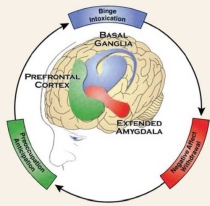Advances in the understanding of brain development, as well as the role that genes and environment play in addiction, are the focus of a review article published today in The American Journal of Psychiatry. The authors discuss how more than three decades of research in genetics and neuroscience can help investigators identify new evidence-based prevention strategies and effective treatments for opioid, alcohol and tobacco use disorders. The lead author is Dr. Nora Volkow, director of the National Institute on Drug Abuse, part of the National Institutes of Health.
For a copy of the paper, go to — "Neuroscience of Addiction: Relevance to Prevention and Treatment."
More information on addiction can be found on the Addiction Science webpage.
For more information, contact the NIDA press office at media@nida.nih.gov or 301-443-6245. Follow NIDA on Twitter and Facebook. The NIDA website is www.nida.nih.gov.
NIDA Press Office
301-443-6245
media@nida.nih.gov
About the National Institute on Drug Abuse (NIDA): NIDA is a component of the National Institutes of Health, U.S. Department of Health and Human Services. NIDA supports most of the world’s research on the health aspects of drug use and addiction. The Institute carries out a large variety of programs to inform policy, improve practice, and advance addiction science. For more information about NIDA and its programs, visit www.nida.nih.gov.
About the National Institutes of Health (NIH): NIH, the nation’s medical research agency, includes 27 Institutes and Centers and is a component of the U.S. Department of Health and Human Services. NIH is the primary federal agency conducting and supporting basic, clinical, and translational medical research, and is investigating the causes, treatments, and cures for both common and rare diseases. For more information about NIH and its programs, visit www.nih.gov.
NIH…Turning Discovery Into Health®

